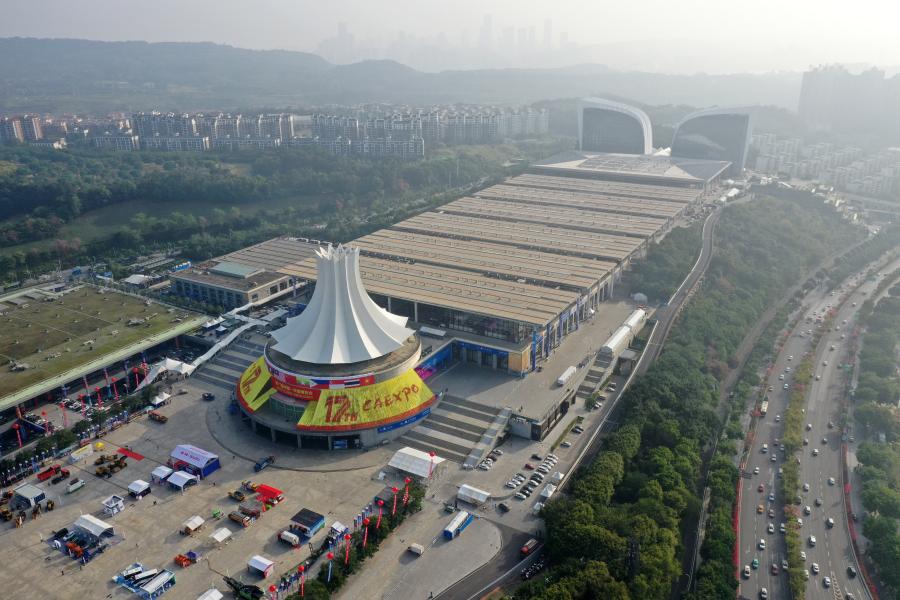Think tank discusses strengthening China-ASEAN ties
chinadaily.com.cn | Updated: 2022-05-14 21:08

China-ASEAN relations have entered a new phase of Comprehensive Strategic Partnership. Hainan Free Trade Port, which aims to build an important gateway, is the strategic hub and intersection of China-ASEAN comprehensive cooperation. In this context, the China Institute for Reform and Development (CIRD) and relevant think tanks jointly initiated the ASEAN-Hainan Free Trade Port Think Tank Network (hereinafter referred to as "the Network").
On May 13, the ASEAN-Hainan Free Trade Port Think Tank Network held its first work meeting. Representatives from think tanks in China and other countries in the region, including Indonesia, the Philippines, Vietnam, Singapore, Thailand, Malaysia and Cambodia, participated to exchange views on relevant work of the Network and ways to strengthen China-ASEAN economic and trade cooperation as well as ties among member think tanks.
I. Focusing on economic and trade cooperation between China and ASEAN
Jusuf Wanandi, Co-founder, Centre for Strategic and International Studies, Indonesia: China and ASEAN have always been good partners in security and economic development. In the new context, China and ASEAN both face the task of promoting economic growth through bilateral exchanges and cooperation, for which ASEAN-Hainan Free Trade Port Think Tank Network will play an indispensable role.
Nguyen Huy Hoang, Director General, Institute for Southeast Asian Studies, Vietnam Academy of Social Sciences, Hanoi: The pandemic, combined with the Russia-Ukraine conflict, is reshaping the international landscape. Against this backdrop, the primary task is to strengthen closer cooperation with China. Joining the ASEAN-Hainan Free Trade Port Think Tank Network is conducive to strengthening the relations between Vietnam and China.
Chi Fulin, President, China Institute for Reform and Development: As development and conflict increasingly become a prominent global issue, regional architecture of economic and political security is undergoing unprecedented changes. Facilitating the ASEAN-led RCEP cooperation and deepening practical cooperation between the two sides have become a major challenge for regional security and development. Therefore, ASEAN- Hainan Free Trade Port Think Tank Network put forward new proposals.
Zhang Yuyan, Director, Institute of World Economics and Politics, Chinese Academy of Social Sciences: In the new global context, the establishment of ASEAN-Hainan Free Trade Port Think Tank Network is greatly significant, especially in the face of rising protectionism, profound changes in international geopolitics and intensifying global conflicts. Promoting economic and trade cooperation and people-to-people exchanges between China and ASEAN through the Network is not only conducive to the common prosperity and development of regional economy, but also to regional security and global peace.
II. Giving play to the strategic pivotal role of Hainan free trade port in China-ASEAN economic and trade cooperation
Zhang Yuyan, Director, Institute of World Economics and Politics, Chinese Academy of Social Sciences: Hainan has a very special location in China. It is not only a free trade port and a province, but also an important bridge to strengthen the ties between China and ASEAN.
Chi Fulin, President, China Institute for Reform and Development: Hainan Free Trade Port needs to seize the opportunity of the RCEP agreement, focusing on building "two headquarters bases", which is the headquarters base for Chinese enterprises to invest in ASEAN countries via Hainan Free Trade Port and the headquarters base for ASEAN enterprises to enter China's big market via Hainan Free Trade Port. It is urgent for Hainan to study and formulate relevant specific policies and systems so as to play a strategic pivotal role in regional cooperation.
Li Mingjiang, Associate Professor, S. Rajaratnam School of International Studies, Nanyang Technological University, Singapore: The Network has a special role to play in strengthening China-ASEAN ties. It is proposed that the Network should set up small research groups to carry out joint research in areas such as strengthening cooperation in bilateral economic and trade and regional maritime security.
Ngeow Chow Bing, Director of the Institute of China Studies, University of Malaya: The Network plays a vital role in deepening China-ASEAN relations. It can also actively promote local cooperation, especially the exchanges, cooperation and mutual learning between Hainan Free Trade Port and Langkawi Island, Malaysia.
Wu Shicun, Chairman, China-Southeast Asia Research Center on the South China Sea: The initiation of ASEAN-Hainan Free Trade Port Think Tank Network is a significant event in the relationship between China and ASEAN. Here are some suggestions: first, to strengthen the impact of the Network through joint research and report launch; Second, to ensure the sustainable development of the Network and build a platform for academic information collection; Third, to organize symposiums and hold talks with the industry with regard to the construction of the "two headquarters bases".
III. Facilitating economic and trade cooperation and people-to-people exchanges between China and ASEAN
Nguyen Huy Hoang, Director General, Institute for Southeast Asian Studies, Vietnam Academy of Social Sciences, Hanoi: With a shifting international landscape, the Network can promote research in areas including innovating China-ASEAN cooperation, regional security development, public health and health cooperation, as well as play an important role in facilitating result sharing, personnel exchanges and information connectivity.
Kong Tuan Yuen, Research Fellow, East Asian Institute, National University of Singapore: It is suggested that to leverage the platform of the Network and focus on common concerns of all parties and set up research teams to conduct joint research, give more targeted policy suggestions, with the aim to better serve policy decision of the two sides.
Rommel C. Banlaoi, President, Philippine Association for Chinese Studies: First, to decide on research fields and carry out joint research in security and economic, environmental, political social fields; Second, to build expert team with research expertise to further research; Third, to strengthen mutual support among members of the Network as well as connections with other think tanks in the region.
Guo Yanjun, Director, Institute of Asian Studies, China Foreign Affairs University: To conduct research focusing on digital economy, new energy, environmental protection, biodiversity, climate change and sustainable development, encourage local governments to better participate in China-ASEAN cooperation, and promote the alignment of local development plans between China and ASEAN. Meanwhile, giving play to the important role of Hainan Free Trade Port in promoting China-ASEAN cooperation in digital economy, tourism, health industry and other fields.
ASEAN-Hainan Free Trade Port Think Tank Network was initiated by 17 think tanks and scholars from nine countries, including Haikou-based China Institute for Reform and Development and Centre for Strategic and International Studies from Indonesia. The announcement the jointly initiated ASEAN-HNFTP Think Tank Network on April 21, has attracted wide attention across the region, with hundreds of media outlets in China, the Philippines, Thailand, Japan, the United States, France and many other countries carrying reports on the Network. The initiation of the ASEAN-HNFTP Think Tank Network has been listed among major highlights of the BFA Annual Conference 2022.
























